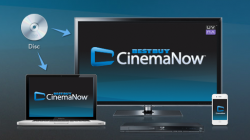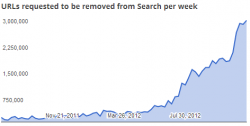So as expected, it was a very quiet week. I took time out to do, well, basically as little as possible. And it was good. With the New Year just around the corner, I think I may try and do the same next week too, (lack of) news permitting.
Seeing this is the last WNR for 2012, I suppose it is also customary to have an end of year review of some sort, but I’m not sure I can remember all that’s happened to do it justice.
I guess the two biggest events of the year actually happened right at the start of the year. First, SOPA (and PIPA) was stopped, and then almost in retaliation, Megaupload was also stopped by the powers that be. The rest of the year sort of pivoted around the events in January, but we also saw the usual stuff. The Pirate Bay was targeted again and again, and again, it remains fully operational, probably more resilient than ever. Censorship regimes propped up all over the place, most of them, if we’re being totally honest, were all attempt to shut down TPB (again, none of them really did much).
But for all the efforts to stop sites like TPB, either through litigation, legislation or technology, the emergence of new legal online services might finally be turning the tide against piracy. Spotify, Netflix, Amazon, and yes, even the industry’s much maligned UltraViolet service, all played a role in giving people a viable alternative to piracy. And Hollywood is just starting to get a taste of the fruits of embracing the Internet, something that perhaps will bring more common sense to the copyright debate in the coming year.
I believe in this because I have seen the industry’s fear abate as the year went on. The emergence of digital streaming and download services has had a huge effect on DVD revenue, but far from the hysteria that I might have once expected, it was all quite calm and optimistic from the industry. Blu-ray’s ongoing success may have partially allayed fears, as was the slight “recovery” (or at least a slow down of the decline) for DVD, but I believe it was the mega million dollar deals being made in the subscription streaming sector that was helping to more than offset any losses in DVD revenue, that helped the industry see the light. Whether the exorbitant amounts being asked of companies like Netflix and Amazon, and the new Redbox Instant, is sustainable, I don’t know. There is definitely some “loss leading” going on, and Hollywood studios are definitely taking advantage, but there’s also a huge untapped market out there unaware or unable to use these services right now. Improvement in infrastructure, with the help of ISPs, and just more education, more support from the industry (in terms of getting content out there), will hopefully see the next boom in home entertainment.

The release of the Wii U capped off a largely disappointing 2012 for gaming revenue, but things may start to pick up again in 2013
For gaming, the boom that was the last few years pretty much ended in 2012. The Xbox 360, which had enjoyed months of year-on-year growth, was now on the decline. The PS3 followed suit, in second place to the Xbox 360, as it had been throughout most of this generation in the US. The Wii’s decline had started much earlier, and did not get better. There was not a single month in 2012 that was overly positive, in terms of hardware and game sales, and even the release of the Wii U could not generate the kind of optimism that had been prevalent in the last couple of years. I think 2013 is when the optimism will come back, when the next Xbox and the next PlayStation is unveiled, if not released. The Wii U has started the next gen rolling, but it’s always until most of the other players get involved that things start to heat up, and I think this will happen in 2013.
If not, then perhaps we’ve just been really spoilt with a couple of really great years for gaming, both in terms of the games produced, and also the record sales, which were far above the “normal” that even the most optimistic industry estimates had imagined. The new normal may not be as sexy, but as long as companies continue to produce great games, gamers like myself should consider ourselves lucky.
And this brings us to the only news item this week, and a sort of sad one, to some.
![]()
The end of the year, and the end of an era. The first steps towards discontinuing the PS2 has started, with Sony stopping the shipment of the console in Japan once the current stock runs out, according to reports.
It’s been a glorious run for the nearly 13 year old console, having sold more than 150 million units and hosted a library of more than 10,000 games. It has survived through three console generations, ended the fortunes of Sega as a hardware maker, saw through the decline and the rise again of Nintendo, and the emergence of Microsoft as a key player in the industry. Even as late as 2008, it was still the most played console that year, according to Nielsen.
But for all the successes of the PS2, Sony was unable to replicate it with its successor, the PS3. This was largely due to the advent of the casual gaming phenomenon largely led, in the home at least, by Nintendo’s Wii and largely misunderstood by Sony, and also the coming of age of Microsoft’s Xbox gaming platform via the Xbox 360. Sony also underestimated the demand for online gaming, something that had existed as an option on the PS2 but not fully embraced or centrally organized until some four years after Microsoft’s launch of their Xbox Live platform.
And while the emergence of DVD home video, of which the PS2 was one of the most affordable players during the early days of the format, helped the PS2 greatly in terms of penetration, the same could not be achieved to the same degree with the PS3 and Blu-ray. The expense of including Blu-ray playback also made the PS3 noncompetitive against the likes of the much cheaper (but inferior, technologically speaking) Wii or the one year older (and thus cheaper) Xbox 360. It was a pricing battle that Sony never managed to win until it was too late (when Blu-ray players were a dime a dozen, and the Xbox 360 had established a dominant lead, sans Blu-ray, in the US).
As for the PS2, we bid thee farewell. You had a great run, and you shall live on in our memories as a true gaming icon, alongside the likes of the Atari 2600, the NES, the Super NES and the Sega Genesis. Honorable mentions to the cult classic Dreamcast too.
So that’s it for 2012. Hope you’ve had a good year, and hope that 2013 will be better. See you next year.















